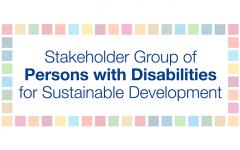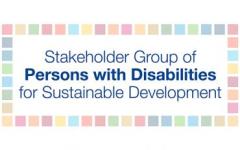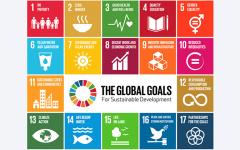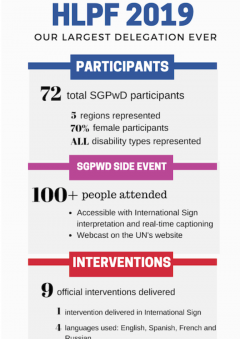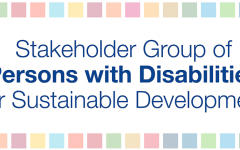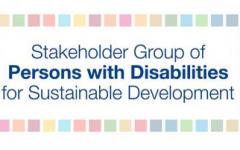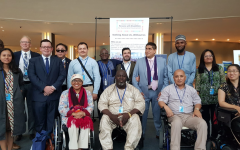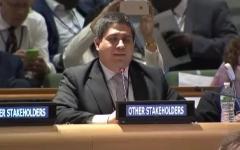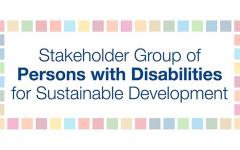General Information
The 2018 High-level Political Forum (HLPF) will be held from Monday, 9 July, to Wednesday, 18 July 2018 in New York. The theme is "Transformation towards sustainable and resilient societies." The set of Goals to be reviewed in depth are Goals 6, 7, 11, 12, 15 and 17.
Forty-seven countries will report on their progress achieved on implementing the SDGs. These countries include: Albania, Andorra, Armenia, Australia, Bahamas, Bahrain, Benin, Bhutan, Cabo Verde, Canada, Colombia, Dominican Republic, Ecuador, Egypt, Greece, Guinea, Hungary, Iceland, Ireland, Jamaica, Kiribati, Lao People’s Democratic Republic, Latvia, Lebanon, Lithuania, Mali, Malta, Mexico, Namibia, Niger, Paraguay, Poland, Qatar, Republic of the Congo, Romania, Saudi Arabia, Senegal, Singapore, Slovakia, Spain, Sri Lanka, State of Palestine, Sudan, Switzerland, Togo, United Arab Emirates, Uruguay and Vietnam. More information can be found here.
Parallel events to be organized during the HLPF:
- July 11th - Higher education institutions and universities, more information here.
- July 13th - Partnership exchange, more information here.
- July 16th - Local/regional authorities’ forum (forthcoming).
- July 17th - Business forum, more information here.
In this edition:
I. Featuring: Financing for Development
- Background
- UN and Other International Commitments
- Recommendations and Key Asks
- Economic Justice for All
- Call for HLPF Speakers by the UN
- Thematic Group on Disaster Risk Reduction
- Webinar Series on SDGs
- Data Survey
- Volunteer Experts STI
- Official Submission on Behalf of the Stakeholder Group of Persons with Disabilities – Inclusive, Safe, Resilient and Sustainable Societies and Persons with Disabilities
- HLPF Side-Event on Goal 11
- IAEG-SDGs
[INFORMATION] 2018 Forum on Financing for Development
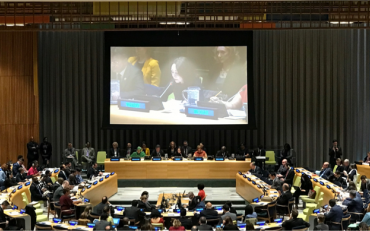
The 2018 Forum on Financing for Development follow-up (FfD Forum) was held at the UN in New York from 23 to 26 April 2018. For the first time, persons with disabilities have been strongly included in FfD follow up as a result of long-term advocacy. As an example, in the first presentation of the opening session of the Forum, the President of the Economic and Social Council, Marie Chatardová said that financing for development needs to be accessible and to leave no one behind, including persons with disabilities.
Additionally, the Forum’s inter-governmentally agreed conclusions and recommendations are inclusive with three explicit references to persons with disabilities – for the first time! This outcome document is important as it feeds into the overall follow-up and review of the implementation of the 2030 Agenda for Sustainable Development in the High-Level Political Forum (HLPF) on Sustainable Development. The references are found in paragraphs 15, 27, and 30, highlighting gaps in financial inclusion; the need to strengthen education, employment, and social protection policies; and efforts to collect, analyse and disseminate disaggregated data for persons with disabilities. Also, persons with disabilities were referenced throughout the Forum by the World Bank, Japan, as well as in numerous side events.
Please continue reading about the role of persons with disabilities in the financing process:
1. Background
There are one billion persons with disabilities worldwide – 15 percent of the world’s population. Persons with disabilities experience compounding social, economic and political inequality, which is exacerbated when disability intersects with other forms of discrimination, including on the basis of gender.[1] Such inequality and disempowerment mean that, in any context where power imbalances distort the distribution of resources within society, one of the most extreme impacts will probably be on resources for the rights of persons with disabilities. We see this pattern clearly in situations of austerity, where persons with disabilities are often hit particularly hard.[2]
2. UN and Other International Commitments
The Addis Ababa Action Agenda (AAAA) contains six explicit references to persons with disabilities and disability, one to “inclusive education,” one to “inclusive learning environment” and two to “accessible” technologies and infrastructures. What is more, unless the rights of persons with disabilities are addressed in the financing for development agenda, it will be impossible to fulfil a wide range of other international commitments, including the United Nations Convention on the Rights of Persons with Disabilities (CRPD);[3] the 2030 Agenda for Sustainable Development – particularly its commitment to leave no one behind;[4] and the Beijing Platform for Action.[5]
3. Recommendations and Key Asks
Reflecting our mandate and expertise, these recommendations focus on persons with disabilities. However, many of our recommendations are also likely to apply to other populations experiencing identity-based discrimination.
4. Economic Justice for All
Many of the barriers that prevent persons with disabilities from enjoying their rights are the extreme manifestation of wider economic and political injustices. We join our voice and representation with the Civil Society FFD Group and Women’s Working Group on FFD, in calling for:
- Equal inclusion of all countries in decision making on international tax cooperation;
- Pro-poor taxation systems;
- Full transparency overall actual or proposed public-private partnerships, including compliance with the Open Contracting Global Principles;
- Fulfilment of commitments on Official Development Assistance and effective development cooperation;
- Alignment of decisions on trade and debt with human rights obligations, and the creation of a transparent, accountable and independent debt workout institution; and
- Reform of the governance of the international financial and monetary system, to uphold the rights of the poorest.[6]
1) Putting the furthest behind first in resource allocation
Dedicated resources are needed to tackle the economic and social inequalities that leave persons with disabilities behind. This includes not only disability-specific expenditures (e.g. tax exemptions or other policies to ensure affordable access to assistive devices),[7] but also allocations to fulfil the rights of persons with disabilities within “mainstream” budget areas (e.g. an allocation for sign language interpretation within the education budget, to help deaf children attend school). Non-discrimination against persons with disabilities should be a key criterion in the assessment of proposed economic reform policies,[8] and should be reflected in clear guidelines for the International Monetary Fund and for Regional Financing Arrangements.
We call for a progressive increase in dedicated domestic resource allocation and international development cooperation to support the full inclusion of persons with disabilities and their families in sustainable development. “Innovative” financing tools such as blended finance risk diverting resources from activities that would best fulfil the rights of persons with disabilities and other marginalized groups, and we urge that blended finance should not be used without a full, participatory, human rights impact assessment.[9]
2) Policies to prioritize rights and accessibility
Effective regulation is essential to ensure that all development finance – public and private – complies with relevant obligations in the CRPD, as well as commitments in the AAAA paragraphs 12, 14, 16, 78 and 114. We call for regulations in all areas of government spending to be aligned with the CRPD. We call particularly for the full adherence of private investments to human rights standards, with effective redress for any transgressions.
Accessibility is a precondition for persons with disabilities to enjoy other rights and to benefit from infrastructure, ICT and financial services on an equal basis with others. We call for Member States to live up to the commitments on accessibility in the AAAA by making accessibility a key criterion in the mobilization of finance, including by building accessibility requirements into all public procurement procedures.
3) Transparency, accountability and participation in financial decision-making
A sustainable solution to the inequalities that persons with disabilities face in development finance will require a redistribution of power. As a starting point, we call for the following steps to make financial decision-making accountable to persons with disabilities:
- Transparent reporting of domestic and international resource allocations for the realization of disability rights, including through the agreement and implementation of the proposed disability policy marker on the OECD DAC Creditor Reporting System, as well as through disability disaggregated data on development outcomes (AAAA, para 126). Key information should be made available in easy-to-read language to enhance accessibility. We also call for the Inter-Agency Task Force, in its 2019 report, to examine best practices in transparency over the distributional impact of development finance, including the impact on persons with disabilities.
- The full participation of persons with disabilities and their families as experts in inclusive and accessible citizen-led social accountability mechanisms engaged at all stages of the process to design, implement and monitor budget and fiscal policies.
Further Information:
- Additional BLOG: https://blog.cbm.org/?p=4025&preview=true
- WEBINAR!If you would like to know more about Financing for Development and persons with disabilities join our next webinar! On the10am - 11am EDT 10 May 2018
- The next webinar will focus on financing for development (FfD) and persons with disabilities. There will be an introduction to the UN processes and the 2018 FfD Forum. We will discuss key points gathered from the Stakeholder Group of Persons with Disabilities and related FfD position papers. Also, an update will be provided on the OECD DAC Marker and FfD debates and linkages with persons with disabilities (e.g. the global tax body, debt crisis, pros and cons of public-private partnerships, and blended finance). There will be plenty of time for questions and answers. We encourage all of you to join!
The webinar will be held from 10-11am EDT on 10 May, 2018. Click here to register for Financing for Development and persons with disabilities on May 10, 2018 10:00 AM EDT.
After registering, you will receive a confirmation email containing information about joining the webinar.
The webinar will provide International Sign interpretation and real-time captioning. The webinar will be recorded and shared later for those who cannot join.
[APPLY!] Call for HLPF Speakers by the UN - Deadline: Sunday, 13 May 2018
The 2018 High-Level Political Forum on Sustainable Development (HLPF) will be held at UNHQ in New York from 9 to 18 July 2018 in New York. The theme for the session will be: Transformation towards sustainable and resilient societies (download the 2018 HLPF Draft Programme). More information is available here.
Representatives of Major Groups and other Stakeholders are invited to nominate practitioners and eminent experts to contribute to the various thematic roundtable discussions to be organized during the first five days of the HLPF session. More information on the nature of the nominations can be found in the form (click here to access it).
[NEW! JOIN!] Thematic Group on Disaster Risk Reduction! You are invited to JOIN!
Under the Stakeholder Group of Persons with Disabilities, we are launching the establishment of a NEW!Thematic Group on Disaster Risk Reduction (DRR). This thematic group will support the engagement of persons with disabilities, their representative organizations and other relevant stakeholders to contribute to the monitoring of the Sendai Framework for Disaster Risk Reduction (included within the 2030 Agenda framework), under the umbrella of the Major Groups and Other Stakeholders mechanism. The DRR Thematic Group will be led by one permanent and one alternate focal point. All those interested to engage/participate in the creation of a Terms of Reference for the group, scope of work, as well as the election of focal points, please contact Georgia Dominik: gdominik [at] ida-secretariat.org. Further details can be found on the IDA website.
[NEW!] Webinar Series on SDGs
Disability Data and SDGs were held on 19 April 2018, Recording for the webinar can be found here: Click here to access the recording of the webinar. Further information on the Washington Group can be found here: http://www.washingtongroup-disability.com/
NEXT WEBINAR on Financing for Development 10-11am EDT on 10 May, 2018. Click here to register for Financing for Development and persons with disabilities on May 10, 2018 10:00 AM EDT.
[PARTICIPATE!] Data Survey
The Stakeholder Group of Persons with Disabilities developed a short survey on disability data, to assess if official data is collected, whether DPOs are involved in any data related work in their country and if there is any need for training on this topic. We would be grateful you could kindly take two minutes to complete this short survey by clicking here.
[ACTION!] Volunteer Experts STI
The third annual Multi-stakeholder Forum on Science, Technology and Innovation for the Sustainable Development Goals (STI Forum) will take place on 5-6 June 2018. The meeting is expected to "provide a venue for facilitating interaction, matchmaking and the establishment of networks between relevant stakeholders and multi-stakeholder partnerships in order to identify and examine technology needs and gaps, including with regard to scientific cooperation, innovation and capacity-building, and also in order to help facilitate development, transfer and dissemination of relevant technologies for the sustainable development goals." It will "discuss science, technology and innovation cooperation around thematic areas for the implementation of the sustainable development goals, congregating all relevant stakeholders to actively contribute in their area of expertise."
If you wish to participate: Click here to register
The Stakeholder Group of Persons with Disabilities would like to draft a position paper, drawing the attention of the forum to the inclusion of persons with disabilities. We are looking for volunteers, who are interested to collaborate in drafting the position paper! Kindly express your interest by emailing:hlpf2018 [at] ida-secretariat.org
[Information] Official Submission on behalf of the Stakeholder Group of Persons with Disabilities – Inclusive, Safe, Resilient and Sustainable Societies and Persons with Disabilities
Thank you to everyone who contributed to the HLPF submission. The HLPF Secretariat integrated comments, finalized the document, and submitted it. Click here to read the submission paper.
[Information] HLPF Side Event on Goal 11
The Stakeholder Group of Persons with Disabilities submitted its HLPF side event application that will be on Goal 11: Make cities and human settlements inclusive, safe, resilient and sustainable(click here to download the concept note). Panellists will share suggestions and best practices on how to implement Goal 11 for persons with disabilities in line with the CRPD by addressing issues such as independent living, universal design, accessibility, road transportation and other relevant areas.
[INFORMATION] IAEG-SDGs
The seventh meeting of the UN’s expert group on SDG indicators (IAEG-SDGs) was held in Vienna from 9-12 April.
We are very pleased that our long-term advocacy on the inclusion of persons with disabilities in the global indicator framework process is producing positive outcomes. One outcome is that the structure of this meeting improved to be more inclusive of stakeholders. Changing from previous sessions, there was only one day of closed sessions with the following three days open to all countries, international and regional agencies and entities, and other stakeholders. Additionally, stakeholders could make interventions in each session during these three days.
The meeting focused on several topics. The most pertinent for persons with disabilities and our advocacy were the (1) discussion on progress made on the work stream on data disaggregation and (2) experiences on implementing monitoring of the SDGs. Also, new and updated documents were shared. Relevant for persons with disabilities, we are quite pleased that the Working Document “Overview of standards for data disaggregation” included all the inputs from the Stakeholder Group of Persons with Disabilities, which includes the Priority List of Indicators that should be Disaggregated by Disability.
The session on data disaggregation was quite inclusive of persons with disabilities. OHCHR presented during the session and included disaggregation by disability and also referenced CRPD Article 31 on statistics and data collection. Click here for the full presentation. In addition, UN Women mentioned that the Washington Group was a good tool for data collection. Most impressive was that UNICEF presented specifically on disability disaggregation focusing much on the recent disability data disaggregation meeting in New York with UN Agencies, IDDC, IDA, and others. You can see some of the presentation slides here. The priority list of SDG indicators, again, was included. Click here for the full presentation.
Later in the meeting, disability data was mentioned again by UN Women and also by the National Statistical Office (NSO) from Egypt on SDG data that they are collecting.
Although this is very positive, there is an underlying trend that disability data is not being collected by NSOs for SDG monitoring. Furthermore, connections between global and national processes need to be strengthened.
What can we do? Suggestions are to:
- continue to monitor and engage with the global process (the 8th IAEG-SDGs meeting will be held in November 2018);
- build the capacity of DPOs at the national level to engage in data advocacy; and
- focus on data projects at the national level that are framed around SDG indicators with the engagement of NSOs, UN Country Teams, and DPOs.
III. WILL YOU ATTEND HLPF?
Kindly let us know if you will attend HLPF or if you are from one of the 47 countries that will be reviewed and would like to contribute to your countries review at HLPF! Click here to fill out the survey.
Contact information
If you have information to share or would like to get in touch with us, please use the email hlpf2018 [at] ida-secretariat.org ()
***
[1] World Bank/World Health Organisation, 2011, World Report on Disability
[2] See for example The Report of the Independent Expert on the Effects of Foreign Debt and Other Related International Financial Obligations on the Full Enjoyment of All Human Rights, particularly Economic, Social and Cultural Rights: Developing Guiding Principles for Assessing the Human Rights Impact of Economic Reform Policies, A/HRC/37/54
[6] For more detail on these issues, please refer to the CSO Declaration from the Addis Ababa Civil Society Forum on Financing for Development, Eurodad’s 2018 FFD Forum position paper, and J Griffiths (forthcoming), “Financing for Development and the SDGs: an analysis of financial flows, systemic issues and interlinkages”.
[7] Such technology includes, but is not limited to, the technologies covered by the Marrakech Treaty to facilitate access to published works for persons who are blind, visually impaired or otherwise print disabled; by the World Health Organisation’s Essential Medicine List, Priority Assistive Products List and the forthcoming World Health Assembly resolution on assistive devices; and by International Telecommunications Union standards and guidance on accessibility; as well as basic sun protection technologies highlighted in the Regional Action Plan on Albinism in Africa (A/HRC/37/57/Add.3)
[8] As recommended in the recent report by the UN Independent Expert on the effects of foreign debt, as above.


